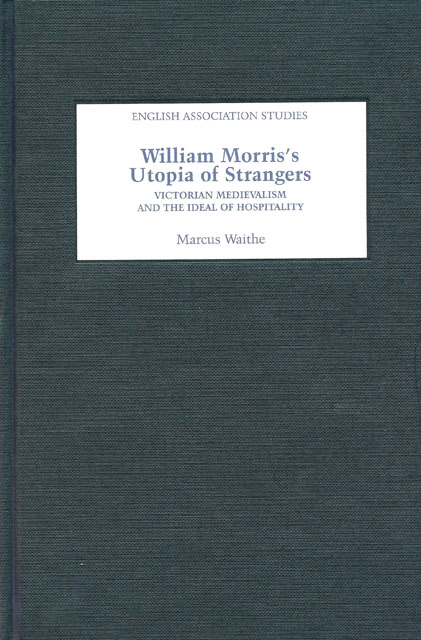Book contents
- Fronmatter
- Contents
- List of illustrations
- Acknowledgements
- Introduction
- 1 Wanderers Entertained: Idealized Hospitality in the Literature of Nineteenth-Century Medievalism
- 2 Before ‘the days when hospitality had to be bought and sold’: Idealized Hospitality and Aesthetic Separatism in Morris’s Work of the 1860s and 1870s
- 3 Entertaining the Past: Problems in Tourism, Translation and Preservation
- 4 Utopian Hospitality: The Teutonic ‘House Community’ and the Hammersmith Guest House
- 5 Legacies
- Conclusion
- Bibliography
- Index
5 - Legacies
Published online by Cambridge University Press: 18 March 2023
- Fronmatter
- Contents
- List of illustrations
- Acknowledgements
- Introduction
- 1 Wanderers Entertained: Idealized Hospitality in the Literature of Nineteenth-Century Medievalism
- 2 Before ‘the days when hospitality had to be bought and sold’: Idealized Hospitality and Aesthetic Separatism in Morris’s Work of the 1860s and 1870s
- 3 Entertaining the Past: Problems in Tourism, Translation and Preservation
- 4 Utopian Hospitality: The Teutonic ‘House Community’ and the Hammersmith Guest House
- 5 Legacies
- Conclusion
- Bibliography
- Index
Summary
This final chapter addresses the legacy of Morris's lifelong experimentation with utopian forms. What influence did his ‘utopia of strangers’ have on the work of his contemporaries, and on that of his immediate successors? To what extent does it offer an alternative resource to utopists wishing to draw on a tolerant or open tradition of the ideal society?While the unhappy course of twentieth- century political history imposes strict limits on the scope for arguing points of this kind, Morris's hospitable socialism influenced a wide range of writers, thinkers and architects in the years leading up to the First World War. Knowledge of this influence is an obvious prerequisite for determining what might helpfully be salvaged from his legacy.
The course of events, it is true, did not follow a trajectory Morris would have countenanced. In Britain, socialism disregarded the revolutionary method. Its leaders opted instead for political compromise, founding the parliamentary Labour Party to further their objectives under the existing structure. Intellectually, it drifted from the anarchism of the SDF and the Socialist League towards the Fabian path advocated by George Bernard Shaw. In parts of the world where an immediate agenda of transformation was pursued, the results were bloody, and utopian only in the sense condemned by Karl Popper. It is even possible to trace a line of continuity between the Arts and Crafts fascination with vernacular architecture and folkways, and the romantic nationalism of National Socialism. The emphasis on welcome was shed along the way, and the line of inheritance was selective: Hitler's genocidal conceptualization of the outsider, and Stalin's adherence to Socialism in One Country had far more affinity with the isolationism and purism of the classical utopia than with the liberal instincts of Morris and his peers. And yet the association between a neo-feudal veneration of ‘home-place’ and fascist philosophies of being is not entirely accidental, whether one considers Martin Heidegger's concern with authentic dwelling or Hitler's cruder notion of Lebensraum.
In the artistic sphere, Morris's emphasis on handicraft endured in isolated contexts. Its most potent resurgence took the form of Mahatma Gandhi's support for spinning wheels as an alternative to the imperial trade in textiles. Yet the general tide of events did not favourMorris's view of things. Even the Bauhaus, an artistic project manifestly and avowedly indebted to the Arts and Crafts Movement, sought to achieve high design standards by means of modern manufacturing techniques.
- Type
- Chapter
- Information
- William Morris's Utopia of StrangersVictorian Medievalism and the Ideal of Hospitality, pp. 171 - 196Publisher: Boydell & BrewerPrint publication year: 2006



